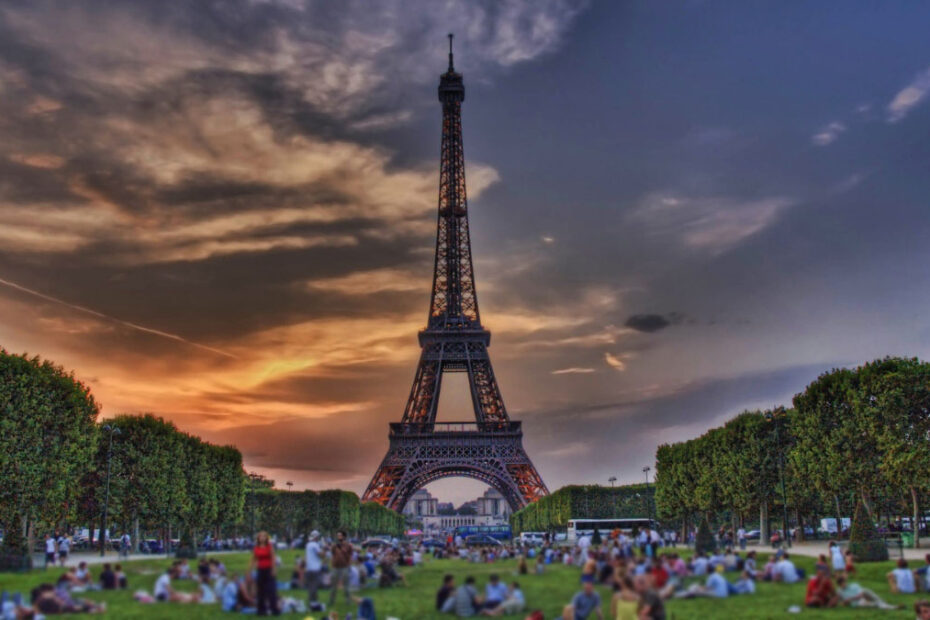Paris, the City of Light, dazzles with its iconic landmarks, world-class cuisine, and romantic ambiance. But, like any major city, it has areas where tourists should tread carefully. While most of Paris is safe, knowing which neighborhoods to avoid can ensure your trip remains memorable for all the right reasons.
In this text, you’ll discover 11 areas in Paris that have higher crime rates or safety concerns. By being informed, you can navigate the city with confidence and enjoy its beauty without unnecessary risks. Let’s jump into the places you should steer clear of to ensure your Parisian adventure is as enchanting as you imagined.
Key Takeaways
- Paris Safety Overview: While generally considered safe, Paris has specific areas with higher crime rates, especially involving petty theft.
- High-Risk Areas: Neighborhoods like Gare du Nord, Les Halles, and Barbès-Rochechouart are known for pickpocketing and other crimes, and should be approached with caution, especially after dark.
- Safety Measures: Tourists should explore during daylight, secure their belongings, and use safe transportation options at night to minimize risks.
- Immediate Actions When Unsafe: Move to crowded areas, contact local authorities, and use reputable transportation options if you feel threatened.
- Practical Tips for Staying Secure: Trust your instincts, keep your valuables secure, seek assistance from locals, and stay informed about local safety advisories before venturing out.
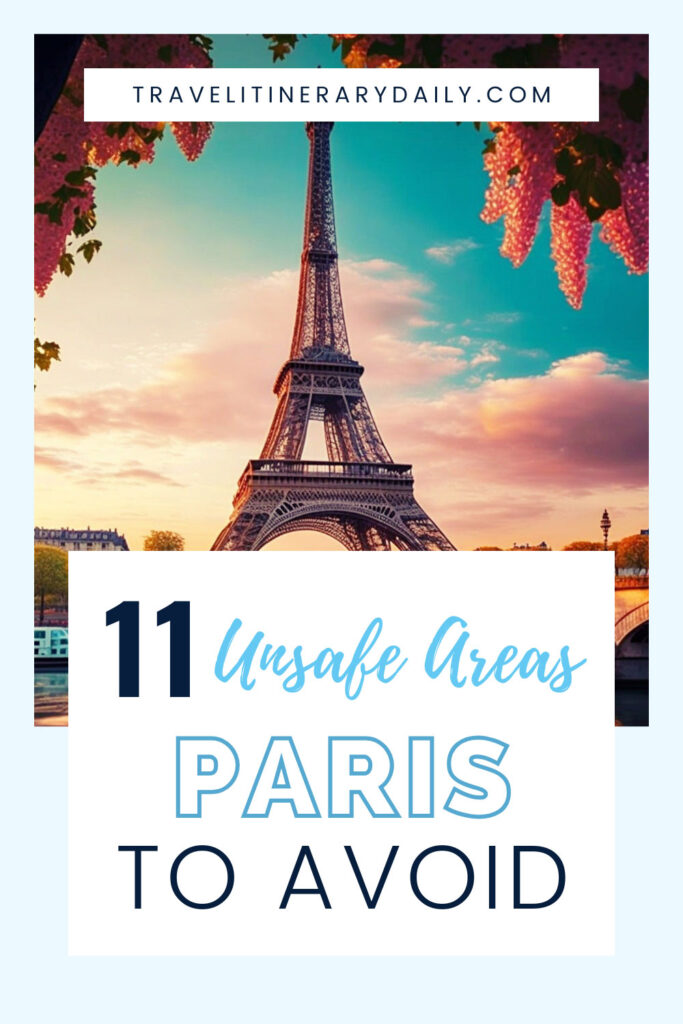
Is Paris Safe?
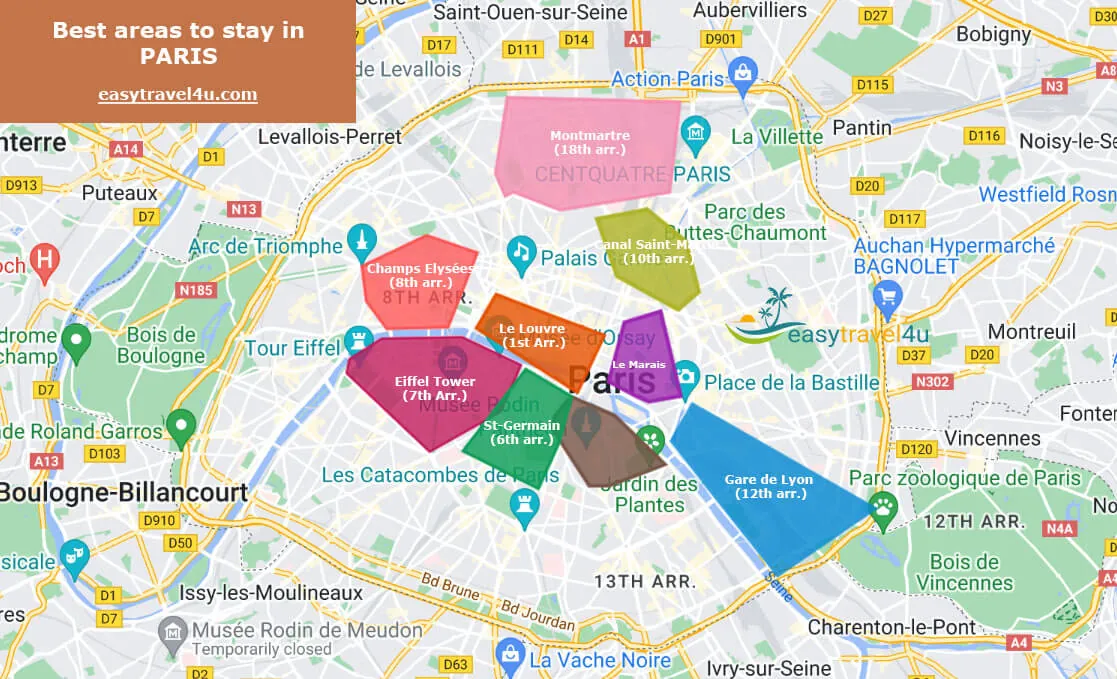
Paris is generally considered a safe city, especially compared to other major cities worldwide. It ranks relatively low on the crime index—162nd out of 576 cities globally as of 2022. Violent crimes are rare, particularly in areas frequented by tourists. Most incidents involve petty theft, like pickpocketing, rather than violent offenses.
During daytime, the city is largely safe, but exercising caution at night is advisable, especially in certain neighborhoods. Paris is vibrant and ever-changing, so staying aware of your surroundings can help ensure a pleasant experience.
The 11 Unsafe Areas of Paris to Avoid
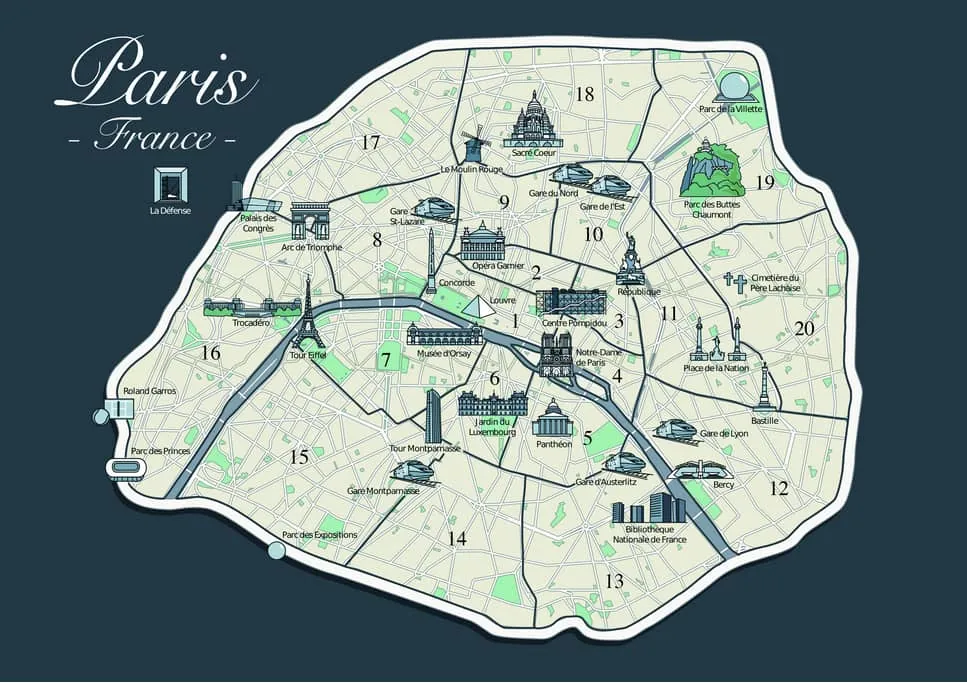
Paris is beautiful but like any major city, it has areas where caution is advised. Knowing these spots can help you stay safe.
1. Gare du Nord and Gare de l’Est (10th Arrondissement)
These busy train stations are major hubs but can become less safe at night. The areas surrounding these stations are known for drug sales, encounters with intoxicated individuals, pickpockets, and altercations. Keep an eye on your belongings and avoid lingering after dark.
2. Les Halles (1st Arrondissement)
Central and lively with a large shopping mall, Les Halles is prone to scams like “free gift” scams and bag snatching. It sees increased crime rates on Saturday nights when suburban youth gather here. Watch your bags and be wary of strangers offering unsolicited help.
3. Porte de La Chapelle (18th Arrondissement)
Known for its cultural richness, this area also deals with homelessness and drug-related crimes. Be cautious of scams such as fake friends and tricky cash exchanges. Visit during the daytime if necessary and stay aware.
4. Barbès-Rochechouart (18th Arrondissement)
This intersection is bustling but has a reputation for pickpocketing and occasional violent outbreaks. Vendors and crowded streets might distract you, making it easier for thieves to snatch your belongings. Hold your bags close, especially in crowded areas.
5. Porte de Clignancourt (18th Arrondissement)
Home to the famous flea market, it attracts both tourists and pickpockets. While the market is worth a visit, keep your valuables secure and avoid wandering into poorly lit areas after dark.
6. Goutte d’Or (18th Arrondissement)
Known for its vibrant African community, Goutte d’Or has issues with petty crime and drug dealing. It’s bustling during the day but can be less safe at night. Stick to main roads and avoid solitary exploration.
7. Château Rouge (18th Arrondissement)
Château Rouge offers a unique cultural experience but also has a higher incidence of pickpocketing and street scams. Stay alert, especially around busy shopping streets. Refrain from displaying expensive items openly.
8. Stalingrad (19th Arrondissement)
This area, with its mix of cultures, has struggled with crime, including drug-related activities and muggings. Frequent incidents occur at night, so it’s best to visit during daylight hours and stay on well-traveled paths.
9. Belleville (19th and 20th Arrondissements)
A former working-class neighborhood that’s rapidly gentrifying, Belleville keeps its rough edges. Street robberies and drug-related crimes can occur. Enjoy the vibrant street art and eateries but stay alert to your surroundings.
10. Porte de la Villette (19th Arrondissement)
Known for its parks and cultural events, it also suffers from sporadic criminal activity, especially drug deals. If you visit La Villette, stick to daytime and crowded events. Avoid wandering off the beaten path.
11. Pigalle (18th Arrondissement)
Famed for its bohemian history and nightlife, Pigalle can be risky after dark. Street scams, pickpocketing, and occasional fights are common. Enjoy the nightlife but stay in groups and avoid engaging with overly-friendly strangers.
Safety Tips for Tourists in Paris
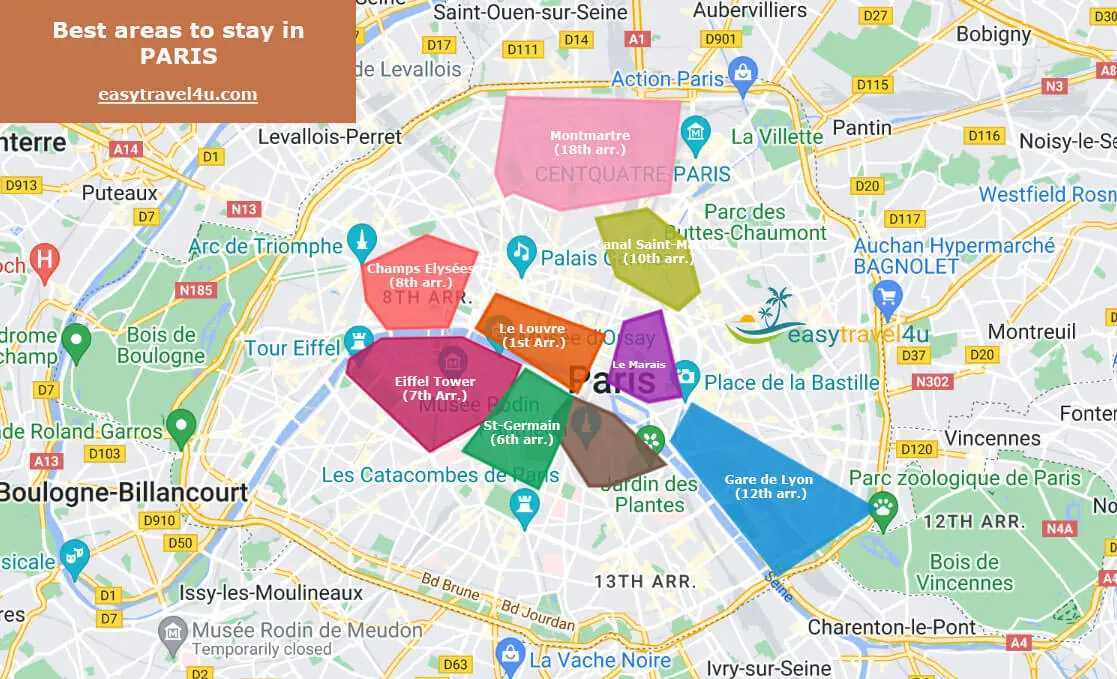
Visiting Paris can be a delightful experience if you stay aware of your surroundings and take some safety measures. Here are practical tips to help you navigate the city safely.
Explore During Daylight
Paris has a lot to offer during the day. Sticking to daylight hours for exploring, especially in less safe areas like Gare du Nord, can reduce potential risks. Many tourist attractions such as the Eiffel Tower and Louvre Museum are bustling with activity and are well-patrolled by police during the day.
Secure Your Belongings
Pickpocketing is common in busy areas of Paris. Keep your belongings secure by using anti-theft bags and keeping valuables close. In crowded areas like Les Halles or metro stations, carry only what you need and avoid displaying expensive items or large sums of cash.
Use Safe Transportation at Night
Opt for well-lit public transportation or reputable ride-sharing services when traveling at night. Avoid walking alone in neighborhoods like Barbès-Rochechouart after dark. If you need to travel late, consider booking accommodations near your intended destinations to minimize nighttime commutes.
What to Do When You Feel Unsafe
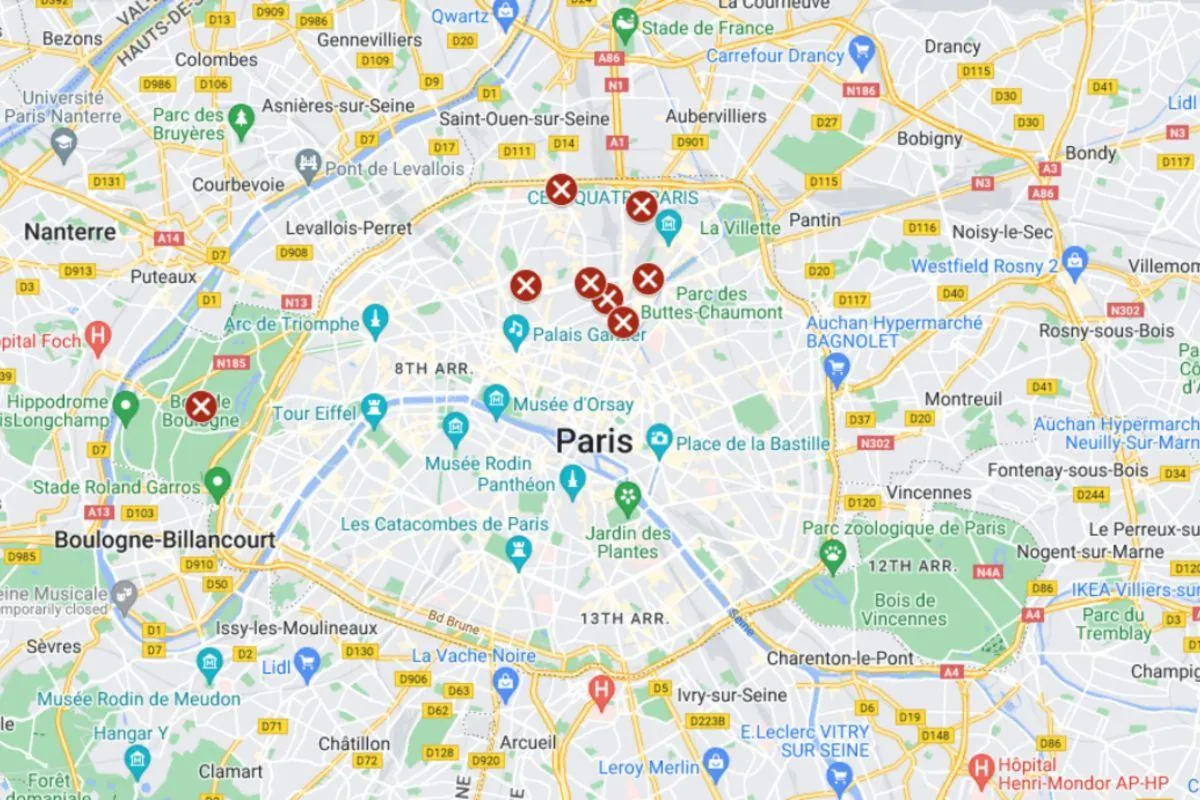
Feeling uneasy in an unfamiliar place can be stressful. Here are practical steps to take if you ever feel unsafe in Paris:
Move to a Crowded Area
Head to the nearest busy location. Well-lit, crowded areas like tourist spots, cafes, or busy streets offer more safety than deserted alleys or dimly lit spaces. The presence of more people can dissuade potential threats like pickpocketing or scams.
Contact Local Authorities
The French emergency number is 112 for police, fire, and medical emergencies. If you feel threatened or witness a crime, don’t hesitate to call for help. French police officers often patrol tourist areas and train stations, so you might find one nearby.
Use Safe Transportation
If you’re in a risky neighborhood, opt for reputable transportation options. Services like Uber or well-known taxi companies are safer than walking alone, especially at night. Paris has a reliable Metro and bus system, which can also be a secure choice when well-patrolled.
Trust Your Instincts
Don’t ignore gut feelings. If something feels off, leave the area, even if you don’t see an immediate threat. Your intuition is a powerful tool for staying safe.
Keep Valuables Secure
Carry a crossbody bag with a zipper or an anti-theft backpack. Always keep your belongings close to you. Avoid displaying valuables like expensive cameras or wads of cash, as this can attract unwanted attention.
Seek Assistance from Locals
Approach shopkeepers or restaurant staff if you feel lost or unsure. Most Parisians working in tourist areas speak English and are willing to help. They can offer directions or call a taxi for you.
Stay Informed
Before venturing out, check local news for any travel advisories or warnings. Websites like the U.S. State Department provide up-to-date information on safety concerns. Staying informed helps you avoid potentially dangerous situations and neighborhoods.
Conclusion
Paris remains a stunning destination brimming with culture and charm. By staying informed about areas with higher crime rates and following practical safety tips, you can enjoy all that the city has to offer while minimizing risks. Remember to be vigilant, especially at night, and keep your belongings secure. Trust your instincts, use reputable transportation options, and don’t hesitate to seek help if needed. With these precautions, your visit to Paris will be both memorable and safe.
Frequently Asked Questions
Which are the top landmarks to visit in Paris?
Paris is home to several iconic landmarks, including the Eiffel Tower, Notre-Dame Cathedral, Louvre Museum, and Arc de Triomphe. Each of these sites offers a unique glimpse into the city’s rich history and culture.
Is Paris safe for tourists?
Paris is generally safe for tourists, with violent crimes being rare, especially in tourist areas. However, tourists should be mindful of petty theft, such as pickpocketing, and stay vigilant, particularly at night in certain neighborhoods.
What are the 11 unsafe areas to avoid in Paris?
The article identifies 11 areas with higher crime rates, including Gare du Nord, Gare de l’Est, Les Halles, Goutte d’Or, Château Rouge, and Pigalle. Visitors should exercise extra caution in these neighborhoods, especially at night.
How can tourists stay safe from pickpocketing in Paris?
To avoid pickpocketing, tourists should use anti-theft bags, keep valuables secure, and be discreet with personal belongings in crowded areas. Staying alert and aware of surroundings can significantly reduce the risk of theft.
What transportation options are safe at night in Paris?
At night, it’s advisable to use well-lit public transportation or reputable ride-sharing services. Avoid walking alone in less safe neighborhoods after dark and opt for known, reliable transportation methods.
What should tourists do if they feel unsafe in Paris?
If feeling unsafe, move to crowded areas, contact local authorities, or use safe transportation options like reputable taxis or the Metro. Trust your instincts and seek assistance from locals if needed.
Are day trips around Paris safe?
Day trips around Paris are generally safe. Most tourist attractions are well-patrolled and bustling during the day, which helps reduce risks. Always stay aware of surroundings and follow local safety guidelines.
Which neighborhoods are recommended for staying in Paris?
Safe and vibrant neighborhoods recommended for staying include the Latin Quarter, Champs Elysées, Le Marais, St Germain, Châtelet, Montmartre, and Canal Saint-Martin. These areas offer a mix of culture, safety, and convenience.
Is Uber a safe option for tourists in Paris?
Yes, Uber is considered safe in Paris for tourists. The app features an emergency assistance button to call authorities if needed, enhancing rider safety.
What safety tips should visitors follow at night in Paris?
At night, stick to well-lit, busy areas and avoid less safe neighborhoods. Use trustworthy transportation methods like reputable ride-sharing services or taxis and avoid walking alone. Stay connected with friends or family and share your location if feasible.

